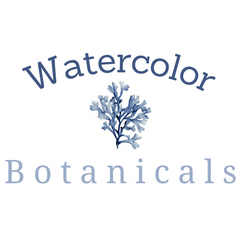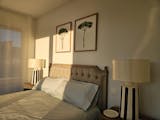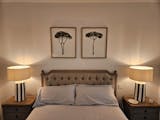The Latest Home Trends of 2025: The Best Ideas and Tips for Your Living Space
 Source: Modern Sage Green Wall Art for Minimalist Homes
Source: Modern Sage Green Wall Art for Minimalist Homes
Imagine opening the door to your home: a space that breathes, adapts, and engages in a dialogue with you. The home trends for 2025 usher in a fascinating new era of living, where technology and nature, functionality and aesthetics, merge in perfect harmony.
The emerging trend of “minimalism” promises the ideal balance between cozy opulence and sleek simplicity—a style that combines warmth and elegance. It invites you to curate your home with select, meaningful pieces that tell your story while creating a calm and inviting atmosphere.
Be inspired by the possibilities the future of living holds. In this article, discover how to transform your home into a place that not only looks stunning but also enhances your quality of life.
#1 Color Trends 2025: From Earthy Tones to Vibrant Accents
 Image Credit: Interior Studio Hamann
Image Credit: Interior Studio Hamann
The color trends of the year invite us to decorate our walls with an intriguing mix of earthy tones and vibrant accents. While 2024 leaned towards understated designs, 2025 takes on a more colorful palette—a reflection of our longing for natural beauty, optimism, and personal expression.
- Earthy Tones and Neutrals: Shades like “Mocha Mousse,” “Apricot Brown,” and classic terracotta symbolize a return to nature, contributing to a soothing ambiance. Warm beige, soft grays like “Moonlight Gray,” and crisp whites like “Pepper White” create a timeless base for versatile designs.
-
Vibrant Accents: Bold hues make daring statements:
- Striking reds as focal points
- Warm yellows and oranges for positive energy
- Calming blues and greens from “Airy Blue” to “Viridian Green”
- Gentle pastels for harmonious transitions
The “color blocking” trend encourages creative combinations. Earthy and natural tones evoke comfort, while bright accents bring energy to the space. Experts emphasize the importance of flexibility and personal expression in color choices, reflecting individuality and contemporary spirit.
Tips:
- Experiment with color blocking: Pair earthy wall shades like “Mocha Mousse” with bold red or orange accents in cushions or curtains.
- Use “Moonlight Gray” as a neutral wall base and complement it with warm sand tones in furniture for a balanced look.
- Incorporate “Viridian Green” through indoor plants or as an accent color for smaller furniture to bring a natural touch indoors.
Bonus tip:
I carefully select a harmonious color palette, typically favoring natural tones and modern shades that complement a variety of interior styles.
#2 Nature and Sustainability: The Return to Organic Materials
Current trends embrace natural materials and sustainability. Wood remains a timeless, versatile material, making its way into various elements of interior design.
 Source: French cottage wall art
Source: French cottage wall art
Rattan is experiencing a revival, bringing a relaxed and airy vibe to rooms. Organic shapes dominate furniture and accessory design, emphasizing the connection to nature. These flowing, soft lines create harmonious and inviting spaces.
A key focus in 2025 is sustainable furniture made from recycled materials. These innovative pieces combine environmental consciousness with aesthetic appeal, proving that responsible consumption and stylish design can go hand in hand.
The use of these natural and sustainable elements allows you to bring a piece of nature into your home while making a statement for environmental protection. This trend reflects the growing awareness of ecological responsibility and offers opportunities to combine personal style with sustainable values.
Practical Tips:
- Swap plastic storage boxes for rattan or seagrass baskets for a natural look.
- Choose furniture made from FSC-certified wood to support sustainability.
- Add a living wall with climbing plants or a vertical herb garden in your kitchen.
“Art has an impressive power: it influences our emotions, promotes relaxation, and opens up new perspectives. Its positive effect on our mental state and health is proven by numerous studies. Especially in spaces meant for relaxation, like bedrooms, art should have a calming effect to enhance our well-being and inner balance.”
#3 Multifunctionality and Flexibility: Clever Solutions for Modern Living Spaces
In 2025, flexible living concepts will shape the way we live, as life and work situations continue to evolve. This development is particularly reflected in the growing demand for multifunctional furniture, which offers smart solutions for modern living needs.
 Source: Set of 3 high-quality autumn leaf wall pictures
Source: Set of 3 high-quality autumn leaf wall pictures
# 4 What Does Minimalism Mean for the Home Trends of 2025?
 Source: Set of 2 modern coastal fish art prints
Source: Set of 2 modern coastal fish art prints
“Less is more” defines minimalism this year. This year, minimalism evolves into a balanced interior style that seamlessly combines functionality and aesthetics. While 2024 was dominated by cool, pared-down designs, the minimalist trend in 2025 embraces a warmer, more inviting approach.
Refined Simplicity
Clean lines and a restrained design language remain the foundation of minimalist living. Especially in the living room, simple yet high-quality furniture takes center stage, impressing with its craftsmanship and timeless elegance. A combination of warm beige tones and natural materials like wood creates a welcoming atmosphere.
Conscious Material Selection
Minimalism places great emphasis on sustainable and durable materials. Each furniture piece is carefully selected to provide genuine value. Natural surfaces, premium woods, and high-quality textiles in neutral colors define the overall aesthetic.
Smart Storage Solutions
Efficient storage is a key aspect of modern minimalism. Built-in cabinets and multifunctional furniture help maintain order and create a clutter-free environment. The focus is on well-thought-out concepts that elegantly conceal functionality.
Creating Atmosphere
Despite its reduced aesthetic, minimalism in 2025 does not compromise on coziness. Thoughtfully placed lighting accents, selected artworks, and statement design pieces add personality to spaces without overwhelming them.Minimalism this year is not about having less—it’s about making more of what truly matters.
#5 Smart Home and Comfort: Technology for a Cozy Home
 Source: Set of 3 Scandinavian tropical fine art prints
Source: Set of 3 Scandinavian tropical fine art prints
Smart home solutions are becoming integral to modern living. The seamless integration of intelligent systems not only enhances comfort but also improves energy efficiency and security.
The European smart home market is expected to reach $29.24 billion in 2025. Popular technologies include:
Smart Controls:
Centralized hubs with sleek touchscreen interfaces allow control of all connected devices.
Energy Management:
Smart thermostats and lighting systems optimize energy consumption.
Security Systems:
AI-enhanced cameras, biometric access systems, and connected alarms ensure comprehensive protection.
At the same time, the desire for cozy retreats is growing. The combination of smart technology and a welcoming atmosphere creates spaces that are both functional and inviting. Warm lighting, comfortable room temperature, and optimal air quality are automatically adjusted to individual preferences.
Practical Tips:
- Install smart thermostats to save energy and regulate room climates efficiently.
- Use smart lighting systems that adapt to the time of day and mood.
- Incorporate a centralized smart home hub for convenient control of all connected devices.
How do I create timeless coziness in the living room?
 Photo rights: Interior Studio Hamann
Photo rights: Interior Studio Hamann
The 2025 living trend combines timeless elegance with a cozy atmosphere and relies on a harmonious combination of different textures and materials. To create timeless coziness in your living space, you can consider the following aspects:
Materials and textures:
- Use high-quality fabrics such as velvet and bouclé to create an inviting atmosphere
- Incorporate natural materials such as wood and stone for timeless elegance
- Combine different textures to create depth and interest
Color scheme:
- Choose a base of neutral tones
- Complement these with current 2025 trend colors for accents
- Create a balanced mix of classic and modern elements
Lighting concept:
- Combine indirect light sources with targeted accent lights
- Create different levels of lighting for a cozy atmosphere
Textiles and accessories:
- Use soft textiles such as cushions, plaids and fluffy rugs
- Choose accessories that give your interior a personal touch
- Use changing accessories and textiles to constantly reinterpret the room
Furniture selection:
- Look for organic shapes with rounded corners and curved lines
- Choose furniture that radiates harmony and looks inviting
- Combine timeless basic furniture with modern accent pieces
How to Integrate Natural Materials into Your Home
Incorporating natural materials into your home brings warmth, coziness, and sustainability to your living space. Here are some practical approaches to embrace this trend:
Embrace the Versatility of Wood
Wood is a key element in this trend. Use it for furniture, flooring, or decorative accents. The warm look of wood creates an inviting atmosphere and pairs well with various styles.
Stone and Marble for Elegant Accents
Incorporate these materials strategically for statement pieces such as coffee tables or countertops. They add a touch of sophistication and create a striking contrast with softer elements.
Natural Textiles for Coziness
Linen, cotton, and wool are excellent choices for curtains, cushions, and rugs. They add texture and warmth to your space, enhancing a cozy atmosphere.
Use Wicker and Rattan
These light, airy materials are ideal for furniture and storage solutions. They perfectly align with minimalist trends and bring a touch of nature indoors.
Explore Innovative Materials
Experiment with cork or bamboo for walls and flooring. These sustainable materials offer unique design opportunities while making an eco-friendly statement.
Combine Materials
Mix different natural materials to add depth and interest. A wooden table with a marble top or a leather armchair on a sisal rug creates eye-catching contrasts.
Coordinate Color Palettes
Choose a harmonious color palette with earthy tones and natural greens or blues. This enhances the overall effect of the natural materials.
Incorporate Plants
Large indoor plants or even green walls are essential for a natural living environment. They not only improve air quality but also establish a strong connection to nature.
How to Effectively Use Accent Furniture
Accent furniture plays a key role in 2025's interior design trends, adding personality and visual interest to your spaces. It's the perfect way to embrace minimalism while giving your home a unique touch.
Here are some tips for effectively using accent furniture:
Choose a Statement Piece
Opt for an eye-catching piece, like a bold red armchair or a sideboard with organic shapes, to become the focal point of the room.
Play with Contrasts
Combine accent furniture made of natural materials, like rattan or wood, with sleek modern furniture for an intriguing mix.
Incorporate 2025 Color Trends
Reflect current trends by selecting earthy tones or vibrant accent colors for your furniture.
Maintain Balance
One or two accent pieces per room are usually enough. They should enhance the space without making it feel cluttered.
Blend Functionality and Design
Accent furniture doesn’t have to be purely decorative. A sculptural chair can double as extra seating, while a striking dresser can provide valuable storage.
Experiment with Placement
Try different positions in the room. Sometimes, an accent piece in a corner can have more impact than one in the center.
Let your personal style guide you, and don’t be afraid to make bold decisions. Accent furniture is your chance to express creativity and bring uniqueness to your home.
How to Use Accent Furniture Effectively
Accent furniture plays a key role in 2025's home trends, adding personality and visual intrigue to any space. It’s the perfect way to embrace the minimalism trend while giving your home a unique, personal touch.
Here are some tips for using accent furniture effectively:
- Choose a Statement Piece – A bold armchair in deep red or a sideboard with organic shapes can become the focal point of a room.
- Play with Contrasts – Pair an accent piece made from natural materials like rattan or wood with sleek, modern furniture to create an interesting mix.
- Incorporate 2025’s Color Trends – Bring trending earthy tones or vibrant accent colors into your furniture choices.
- Maintain Balance – One or two accent pieces per room are usually enough. They should enhance the space without overwhelming it.
Accent furniture isn't just decorative—it can also be functional. A sculptural chair can serve as additional seating, while a striking dresser provides valuable storage.
Experiment with different placements. Sometimes, an accent piece makes a bigger impact in a corner than in the center of the room. Let your personal style guide you, and don’t be afraid to make bold choices!
How to Incorporate Multifunctional Furniture into Your Living Space
With changing lifestyles and work situations, flexible living concepts are becoming increasingly important. The European market for multifunctional furniture is steadily growing, as more people in urban areas seek smart furnishing solutions.
Smart Space Solutions for Easy Adaptability
- Modular Shelving Systems and Flexible Wall Cabinets: Adaptable storage solutions that can grow with your needs.
- Living Room Essentials: Expandable dining tables and sofa beds with storage combine practicality and comfort.
- Integrated Workstations: Workspace designs seamlessly hidden within wardrobe systems.
The Latest Generation of Multifunctional Furniture
Innovative furniture now combines technology with practicality:
- Sofas with Built-In Charging Stations and Hidden Storage: Ideal for modern living.
- Height-Adjustable Tables with Wireless Charging: Perfect for multifunctional spaces like home offices or dining areas.
- Foldable Wall Tables: Great for creating flexible workspaces in smaller homes.
- Ottomans and Side Tables with Extra Storage Compartments: Stylish yet practical for everyday needs.
Prioritize Quality and Longevity
When selecting multifunctional furniture, focus on pieces that are durable, high-quality, and aesthetically pleasing. These investments should meet your daily needs while maintaining visual appeal.
To achieve a balanced and stylish look, combine multifunctional furniture with thoughtfully chosen accent pieces. This creates a space that harmonizes functionality and design, perfectly suited to modern living.
Conclusion
The home trends of 2025 seamlessly combine technology, sustainability, and personal expression into a harmonious whole. Highlights include:
- Color Trends: A mix of earthy tones and vibrant accents.
- Nature and Sustainability: Organic materials like wood, rattan, and recycled materials.
- Multifunctionality: Smart furniture solutions optimizing space.
- Minimalism: Elevated with warm materials and thoughtful design.
- Smart Home: Enhancing comfort, efficiency, and security.
- Natural Materials: Creating a cozy and sustainable environment.
- Accent Furniture: Adding personality without overwhelming the space.
- Timeless Comfort: High-quality fabrics, organic shapes, and layered lighting.
Transform your home in 2025 into a space that is not only visually appealing but also uniquely yours. Explore unique watercolor art to elevate your living space at Watercolor Botanicals.
Browse trend-inspired collections here.
New Wall Print Art Collection, Modern Art Collection, Botanical prints, Farmhouse Wall Art, Nursery Prints, Animal Prints, Coastal Art Prints, Abstract Fine Art, Minimalist fine art Poster
Special Thanks:
A heartfelt thank you to renowned interior designer Isabella Hamann for her invaluable insights and vision, which greatly enriched this article. Her expertise and forward-looking approach to the home trends of 2025 were truly inspiring. Thank you for this wonderful collaboration!








